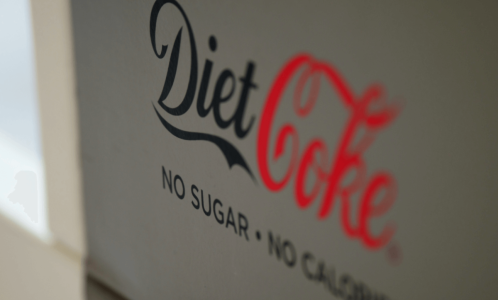World Health Organisation points to a potential cancer link with Diet Coke
- Replies 7
If you've ever experienced a sense of satisfaction from the hiss that accompanies cracking open a can of Diet Coke on a scorching hot day, you might want to prepare yourself. It turns out that your ‘guilt-free’ fizzy indulgence might be serving more than just bubbles.
Remember the good old days when Diet Coke first made its entrance in the 80s? It promised a delicious and comforting cola taste without the troublesome sugar or calories—a game-changer for many.
Fast-forward to today—the World Health Organisation (WHO) has confirmed something many have rumoured for some time—the key ingredient in Diet Coke has, in fact, been linked to cancer.

The irresistible appeal of Diet Coke can be attributed, to a large extent, to aspartame. However, this popular artificial sweetener has recently caught the attention of the International Agency for Research on Cancer (IARC), leading to raised concerns.
Aspartame, which is widely used in various soft drinks and confectionery products worldwide, has now been labelled as a 'possible carcinogen'.
In response, both the IARC and the World Health Organisation (WHO) are working on developing specific guidelines for its consumption. They have thoroughly reviewed numerous published studies to inform their recommendations.
Throughout history, these designations have caused significant worry, legal battles, and modifications in recipes across entire industries. The anticipation is mounting as the World Health Organisation (WHO) experts prepare to unveil a comprehensive analysis of their evaluation of aspartame.
However, there's a bit of a twist to this ongoing discussion. The classification levels used by the IARC suggest that labelling aspartame as 'possibly carcinogenic' does not imply that it is serving cancer on a silver platter.
Rather, it indicates that there is still room for further exploration and investigation into the evidence surrounding the artificial sweetener.
Industry stakeholders are concerned about the potential implications for the global consumption of fizzy beverages and sweet treats. At the same time, organisations such as the International Sweeteners Association (ISA) are diligently working to confirm the overall validity of the findings by the IARC.
Recognising that no food or beverage can be deemed 100 per cent healthy or entirely detrimental to our well-being is important. Rather, it all boils down to being aware of what we consume and practising moderation.
Remember when the World Health Organisation (WHO) made claims about the consumption of red meat being comparable to endorsing a lifestyle that promotes cancer? Or when reports warned about the increased risk of cancer associated with excessive sunbathing?
These statements were never intended to advocate for complete avoidance; instead, they served as reminders to approach these activities in moderation.
In essence, moderation is the key. By maintaining a balanced approach to our consumption habits, we can make informed choices that align with our overall well-being.

Members, as you stand before your refrigerators or push your shopping trolleys down the soft drink aisle, remember that the final choice lies with you. Perhaps now is an excellent time to explore other refreshing beverages.
Herbal teas, infused water, or even good old-fashioned lemonade could be excellent alternatives—they hydrate without compromising your health or taste buds.
We hope you have found this article to be informative and beneficial. Cheers to making refreshing choices!
Remember the good old days when Diet Coke first made its entrance in the 80s? It promised a delicious and comforting cola taste without the troublesome sugar or calories—a game-changer for many.
Fast-forward to today—the World Health Organisation (WHO) has confirmed something many have rumoured for some time—the key ingredient in Diet Coke has, in fact, been linked to cancer.

One of the world's most commonly used artificial sweeteners, aspartame, is set to be labelled as a possible carcinogen. Credit: Unsplash/Brett Jordan.
The irresistible appeal of Diet Coke can be attributed, to a large extent, to aspartame. However, this popular artificial sweetener has recently caught the attention of the International Agency for Research on Cancer (IARC), leading to raised concerns.
Aspartame, which is widely used in various soft drinks and confectionery products worldwide, has now been labelled as a 'possible carcinogen'.
In response, both the IARC and the World Health Organisation (WHO) are working on developing specific guidelines for its consumption. They have thoroughly reviewed numerous published studies to inform their recommendations.
Throughout history, these designations have caused significant worry, legal battles, and modifications in recipes across entire industries. The anticipation is mounting as the World Health Organisation (WHO) experts prepare to unveil a comprehensive analysis of their evaluation of aspartame.
However, there's a bit of a twist to this ongoing discussion. The classification levels used by the IARC suggest that labelling aspartame as 'possibly carcinogenic' does not imply that it is serving cancer on a silver platter.
Rather, it indicates that there is still room for further exploration and investigation into the evidence surrounding the artificial sweetener.
Industry stakeholders are concerned about the potential implications for the global consumption of fizzy beverages and sweet treats. At the same time, organisations such as the International Sweeteners Association (ISA) are diligently working to confirm the overall validity of the findings by the IARC.
Recognising that no food or beverage can be deemed 100 per cent healthy or entirely detrimental to our well-being is important. Rather, it all boils down to being aware of what we consume and practising moderation.
Remember when the World Health Organisation (WHO) made claims about the consumption of red meat being comparable to endorsing a lifestyle that promotes cancer? Or when reports warned about the increased risk of cancer associated with excessive sunbathing?
These statements were never intended to advocate for complete avoidance; instead, they served as reminders to approach these activities in moderation.
In essence, moderation is the key. By maintaining a balanced approach to our consumption habits, we can make informed choices that align with our overall well-being.
Key Takeaways
- The World Health Organisation has designated aspartame, an artificial sweetener used in Diet Coke, as a possible carcinogen.
- The International Agency for Research on Cancer, a leading global health body, confirmed aspartame is potentially harmful after expert assessments and reviewing evidence from scientific institutions around the globe.
- Aspartame's classification as 'possibly carcinogenic' implies there is solid but limited evidence of its potential to cause cancer. The World Health Organisation review will provide further clarification on this matter.
- These declarations have resulted in widespread concern and industrial disputes and may lead to recipe changes from major food and beverage companies.
Members, as you stand before your refrigerators or push your shopping trolleys down the soft drink aisle, remember that the final choice lies with you. Perhaps now is an excellent time to explore other refreshing beverages.
Herbal teas, infused water, or even good old-fashioned lemonade could be excellent alternatives—they hydrate without compromising your health or taste buds.
We hope you have found this article to be informative and beneficial. Cheers to making refreshing choices!







